
Resources
Exhibitor Application
Forum Agenda
Education Program
Meet the Speakers
Leadership Awards
Sponsor Profiles
Why Sponsor?
Forum Floorplan
Advisory Board
Register to Attend
Forum Newsletter
Media Materials
Hotels, Parking & Directions
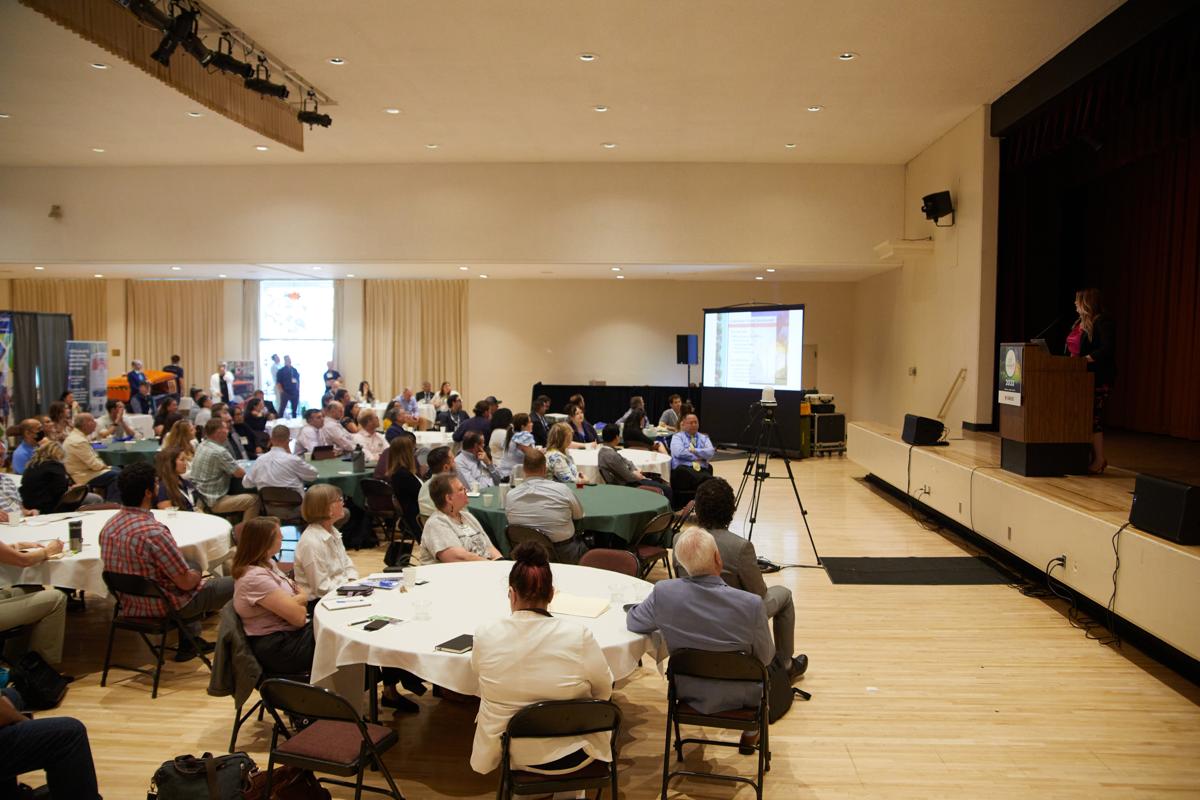
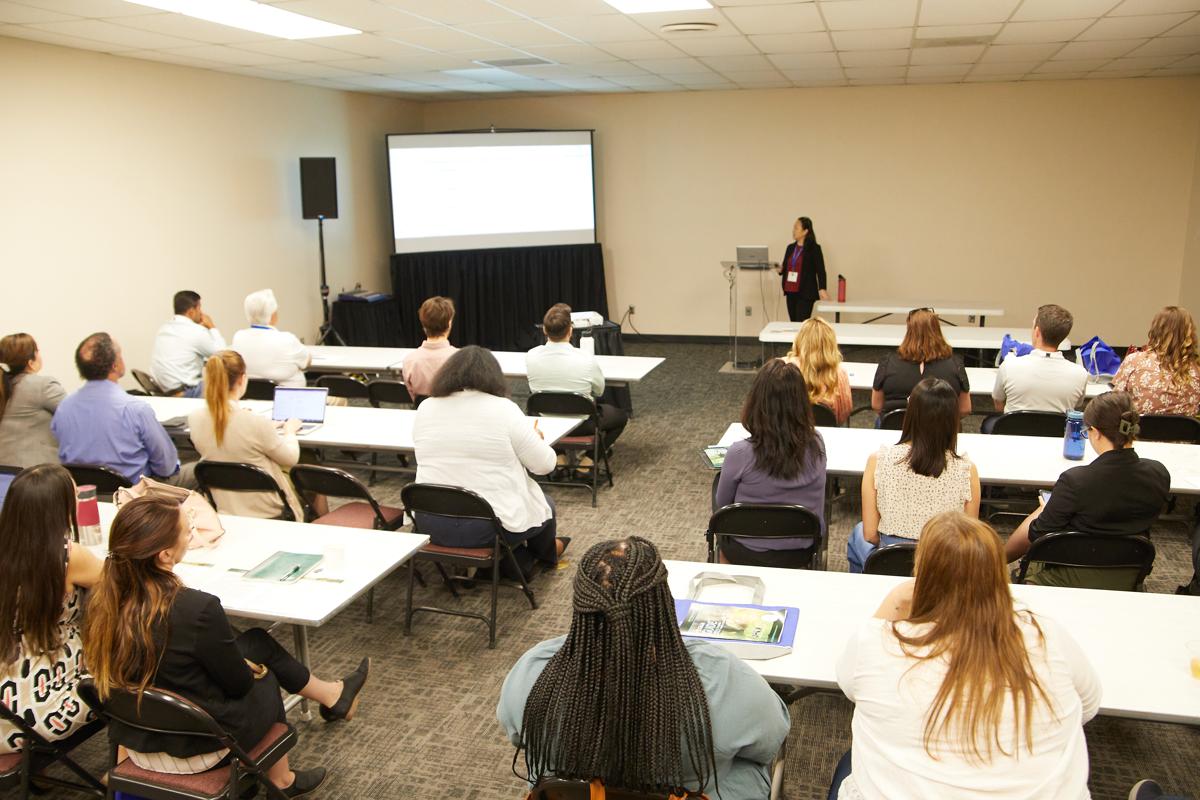
With guidance and direction from our advisory board, the concurrent sessions offer insights from the experts and practitioners at the leading edge of green progress, in fields ranging from transportation and energy to funding, architecture and green schools.
The Education program will include some of the following topics:
- Global Warming: Materials and Manufactured Equipment | Greenhouse Gas Emissions
- Embodied Carbon
- CalGreen Code Updates
- Building Reuse addressing carbon reduction
- Whole Building Lifecycle Analysis
- Energy Code Cycle Updates
- Indoor Air Quality | Co2 monitors and requirements
- Water Solutions: Rain recapture, conservation, containment, case studies, reuse, ground water recharge, Storm water solutions, Irrigation
- Electric Vehicle Infrastructure, charging combinations and Accessibility Requirements
- Power Budget Alternatives 2025
- Fleet Electrification | Zero Emission Fleets
- Roadmaps to Decarbonization
- Waste Diversion | Organic Waste Recycling
- Maintenance: Best Practices for Plans for maintenance and Operations; maintenance strategies; Preventative Maintenance
- Zero Net Carbon and/or Zero Net Energy for Major Renovations
- Funding Opportunities | Sustainability Budget Management
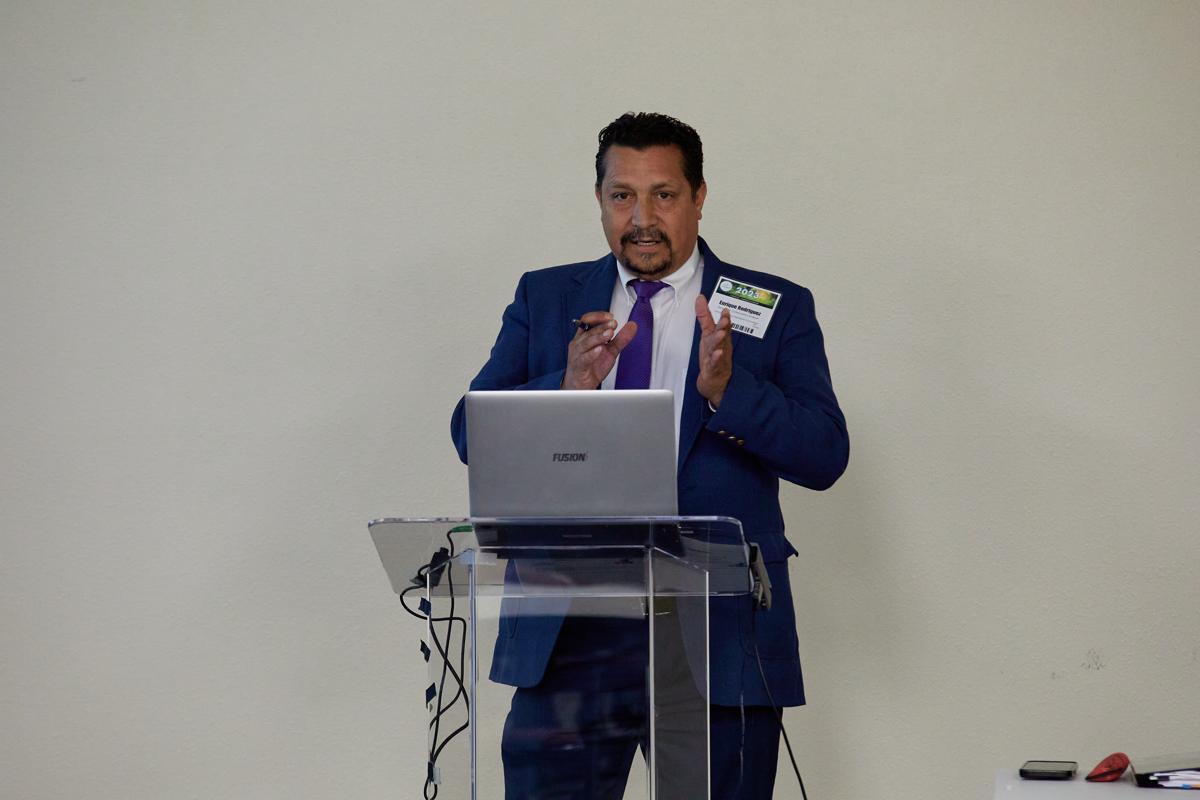
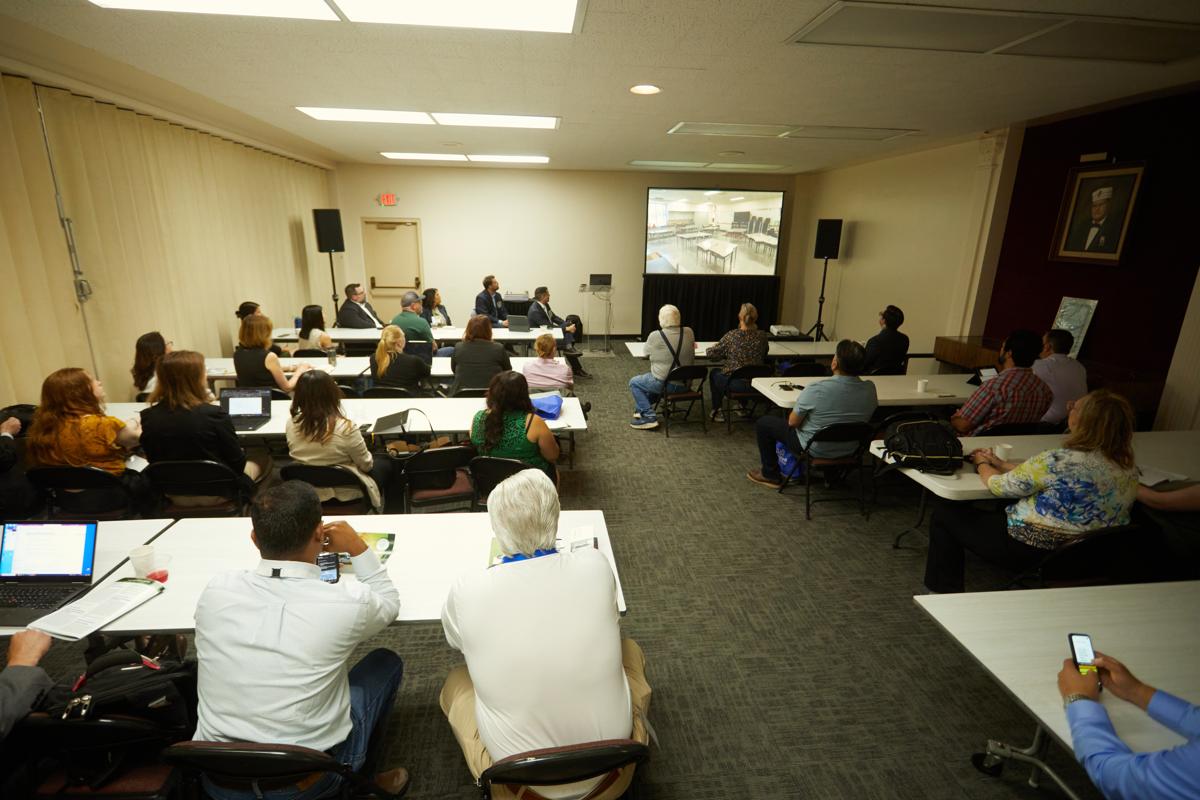
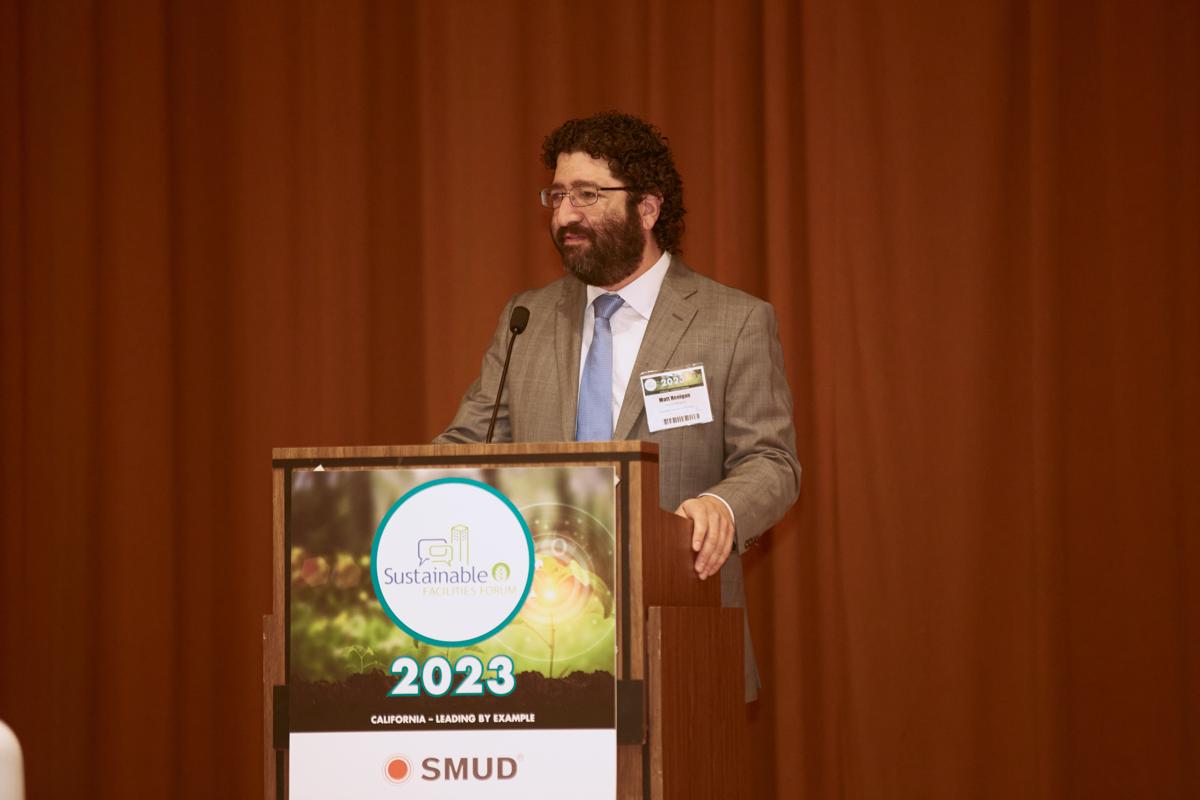
Green Technology is an AIA Provider #G515. We offer certificates of attendance for self reporting for ZNCD (Zero Net Carbon Design) Credits, ICC (International Code Council) and for self reporting for LEED/GBCI Credits. Green Technology is not an official GBCI Provider.
Education Sessions at a Glance:
| Time | Bruno North | Bruno South | Freedom Lounge | Harrison Shepard Hall |
| 10:00am – 11:00am | CALGreen Nonresidential Updates (AIA-LU/HSW) | Preparing a Decarbonization Plan with Deep Stakeholder Engagement (AIA-LU/HSW) | Retro-fitting for Energy Efficiency and Higher IAQ for the Built Environment | Life After Carbon: The New Mindsets to Transform Your Approach to Sustainability (AIA-LU/HSW) |
| 11:30am – 12:30am | Understanding EPDs – For CALGreen Compliance (AIA-LU/HSW) | Commercial Fleet Electrification | Climate Corps Perspectives | Kicking the Carbon out of Historic California Buildings (AIA-LU/HSW) |
| 1:30pm – 2:30pm | Energy Code Nonresidential Update (AIA-LU/HSW) | High-Impact Strategies for Lowering Embodied Carbon in Buildings (AIA-LU/HSW) | Implementing Green Lease: Collaborating with Real Property Management to Implement Sustainability at the County of Alameda | 12:45pm – 1:45pm Sustainable Buildings Working Group *Closed Meeting* |
| 3:00pm – 4:00pm | Aggressive Operational Energy Reduction (AIA-LU/HSW) | Climate Resilient Infrastructure Framework (AIA-LU/HSW) | 2:30pm – 4:00pm Avalanche of Funding: Tax Credits, Grants, and Financing Options for Your Energy Saving Project (AIA-LU) |
MEET THE SPEAKERS:
Find out more about the 2024 speakers for this year’s Sustainable Facilities Forum.
EDUCATION SESSION DESCRIPTIONS:
10:00 AM – 11:00 AM
CALGreen Nonresidential Updates
CBSC staff will present information regarding updates to the California Green Building Code (CALGreen, Part 11 of Title 24) that will go into effect on July 1, 2024. These include new electric vehicle charging regulations (including alternative compliance pathways) for non-residential occupancies, the three new mandatory embodied carbon reduction compliance pathways, and voluntary bird-friendly regulations that local jurisdictions can adopt. Additionally, CBSC will present proposed updates for the triennial edition of Title 24 that is currently in the code development process for publication on July 1, 2025 (effective date January 1, 2026). Learn about proposed expanded EV regulations (with alternative compliance methods) for new construction, and additions and alterations, including office and retail occupancies. Also, proposed changes to bicycle parking calculation methods will be shared, along with new carbon dioxide monitor requirements for University of California and California State University campuses.
ROOM: BRUNO NORTH
Speakers:
Enrique Rodriguez, Associate Construction Analyst, California Building Standards Commission
Irina Brauzman, Supervising Architect, California Building Standards Commission
Preparing a Decarbonization Plan with Deep Stakeholder Engagement
Learn how UC Davis used a staff-led approach to prepare our Fossil Fuel-Free Pathway Plan (FFFPP) to decarbonize campus sources of greenhouse gas emissions. We will describe the UC climate action policy, some basic context about UC Davis, local advocacy efforts, and the charge from leadership to develop a fossil fuel-free plan. We will share our consensus-based approach and engagement techniques, as well as the importance of using staff to develop this plan, versus outside consultants. We will explain the role of the advisory subcommittees and the project team; share experiences regarding balancing and mediating between a policy-based action and a technical-based action; share the value proposition of having staff do the analysis. We will share the detailed approach to addressing our GHG emissions from our central plants to stand-alone buildings; fleet and small equipment; space management policies; and more, while keeping an eye on and connecting to broader opportunities.
ROOM: BRUNO SOUTH
Speakers:
Debra Smith, Associate Director of Major Capital Project Management, University of California Davis / Design and Construction Management
Jim Carroll, Associate Vice Chancellor & University Architect, University of California Davis / Design and Construction Management
Carla Fresquez, Interim Director & Engagement Program Manager UCD Sustainability, University of California Davis / Campus Planning & Environmental Stewardship
Retro-fitting for Energy Efficiency and Higher IAQ for the Built Environment
The heat is on (literally)…architects, engineers, facilities managers and any person involved or has a responsibility in the built environment is challenged to develop better and more efficient designs than ever before. One of many issues we face is, how to keep human beings comfortable and have SAFER-Air™ inside a space, do this cost effectively without putting huge demands on finite resources. It sounds very achievable at first glance; we have aggressive energy efficiency programs and incentives in place to reduce emissions and carbon footprint targets; we have advanced innovative development in materials, processes, AI, smart control systems and all types of energy efficient equipment used in our buildings today, yet we struggle in our HVAC environment to effectively cool and heat large volumes of outside air efficiently. The main reason is, we are bound by the limitations and energy consumption of refrigerated compression systems. Energy penalties are high, equipment costs exceed budgets in many cases and complex control strategies are required to make the solution work. What is the alternative? Delivering fresh filtered outside air at a rate 2-3 times more than most other systems without an energy penalty; we may have something that solves an industry wide concern. Learn how to reduce peak loads when those very hot days arrive, and while most HVAC systems put extraneous load into the grid, we are minimizing it. From the perspective of Indoor Air Quality, there are technologies that go beyond and manage CO2 and other gaseous molecules often not considered by MERV13 filtration strategies.
Join us for a discussion around modernizing your facility and build an environment allowing all aspects of design, operation and maintenance through to end-of-life work to the benefit of you and our world – it is the only one we have right now!
ROOM: FREEDOM LOUNGE
Speaker:
John Fraser-Mifsud, President, Seeley International Americas
Life After Carbon: The New Mindsets to Transform Your Approach to Sustainability
The act of building is destructive. It consumes massive amounts of resources, produces an overabundance of carbon emissions, and is filled with toxic substances. But if we change our mindsets around how we design, we can produce regenerative and restorative buildings that help undo these negative effects. Rather than seeing sustainability as an alternative, learn how to sell the team on reframing their mindsets around targets like net zero energy and wellness. In this brand-new talk, we’ll explore the key mindsets you need to start designing truly living buildings. This will allow you to rethink your approach to clients and projects. We’ll demonstrate how this applies to several case studies of real-world projects. You’ll learn how to shift your client’s thinking about sustainability and the process we use to uncover ways to incorporate these green strategies into your projects without increasing the budget.
ROOM: HARRISON SHEPARD HALL
Speaker:
Ian Merker, Associate Vice President, CannonDesign
11:30 AM – 12:30 PM
Understanding EPDs – For CALGreen Compliance
Set to take effect July 1, 2024, the new mandatory measures for CALGreen will limit the embodied carbon emissions in the construction, renovation, or adaptive reuse of non-residential buildings larger than 100,000 SF and K-12 school buildings over 50,000 SF. These mandatory measures will be adopted into the 2022 California Green Building Standards Code, Title 24, Part 11. One of the Compliance pathways is prescriptive. The prescriptive path addresses building material embodied carbon by using documentation from environmental product declarations (EPDs) to meet global warming thresholds set by the statewide Buy Clean California Act (BCCA) for structural steel, concrete reinforcing steel, flat glass, and mineral wool board insulation as well as concrete mixes. The session will break down EPDs for compliance understanding.
ROOM: BRUNO NORTH
Speaker:
Hafsa Burt, Principal, hb+a Architect
Commercial Fleet Electrification
Learn alongside SMUD experts and commercial customers as they discuss best practices employed when electrifying commercial fleets. Learn about the benefits of fleet electrification, including total cost of ownership through reduced maintenance, fuel and operational costs; with significant environmental impact and through meeting current and future regulations. This session will benefit large commercial entities such as municipalities, airports, state agencies, and a variety of industries including school districts, manufacturing, local contractors, electrical companies, local delivery services including retail and grocery, as well as those in the transportation sector.
ROOM: BRUNO SOUTH
Speakers:
Louie Dias, Commercial EV Program Manager, SMUD
Kristian Damkier, Air Quality Engineer, Sacramento Metropolitan Air Quality Management District
Scot Donaldson, Fleet Maintenance Manager, Twin Rivers Unified School District
Phil Haupt, Owner, Phil Haupt Electric
Holly Montalban, Marketing Director, BetterFleet and Evenergi
Climate Corps Perspectives
State agencies have many no-cost resources available to help facilitate their goals to net zero (the State of CA program and climate corps fellowship being two). This session will provide an overview of these resources to inspire agencies to take advantage of these programs to help hit State energy targets. Three climate corps fellows to present their primary area of focus during their fellowship with Caltrans and DGS. An additional fellow to present information on Federal Funding opportunities for State agencies.
ROOM: FREEDOM LOUNGE
Speakers:
Sarah Sturdy, Senior Manager, AESC Inc.
Maya Noesen, DGS Climate Corps Fellow, State of CA Department of General Services
Benjamin Negose, Caltrans Climate Corps Fellow, State of CA Department of Transportation
Rosie Ballo, Federal Climate Investments Coordinator, AESC, Inc.
Kicking the Carbon out of Historic California Buildings
California is working to decarbonize state buildings and operations by 2035. Learn how the state is decarbonizing the century-old historic Jesse Unruh building to achieve net zero GHG emissions. This major renovation project also greatly reduced embodied carbon while maintaining the historic architecture, pursuing LEED Platinum, Zero Net Energy and Zero Net Carbon upon completion in 2025. Learn from DGS and the project team about what is driving this effort and how this is being achieved. Learn where the state of California is headed to remove emissions from its operations. Learn about state efforts to achieve zero GHG emissions while renovating existing state buildings.
ROOM: HARRISON SHEPARD HALL
Speakers:
Dan Burgoyne, Sustainability Manager, California Department of General Services
Kimberly Butt, Principal, TreanorHL
Chris Barker, Director of Preconstruction, Airco Mechanical Inc.
Andrew Reilman, Managing Principal, MEP West, Introba
1:30 PM – 2:30 PM
Energy Code Nonresidential Updates
This session will provide an overview of major changes to the 2022 Energy Code requirements for nonresidential buildings that went into effect on January 1, 2023. Topics that will be discussed include solar PV, controlled environmental horticulture spaces, commercial and industrial process loads, building envelope, fan and duct systems, HVAC controls, boilers and service water heating systems, indoor and outdoor lighting systems, and grid integration equipment. Information will be provided on the 2022 compliance manuals, forms, and compliance software, along with 2022 Energy Code resources.
ROOM: BRUNO NORTH
Speaker:
Christopher Olvera, Energy Resources Specialist III (Supervisor), California Energy Commission
High-Impact Strategies for Lowering Embodied Carbon in Buildings
Approximately 30 percent of all global carbon emissions are generated from the building sector, with at least 8 percent resulting from the manufacturing of construction materials. Increased attention is being paid to the issue of embodied carbon in buildings and the role that bio-based, low-carbon materials and more efficient building practices can play in fighting climate change and advancing social, economic, and health outcomes. This session will provide an overview of high-impact embodied carbon strategies, with a focus on material innovation (e.g. low carbon concrete), adaptive reuse and deconstruction, environmental product declarations, and updates to local and state regulations (e.g. CalGreen Codes, Buy Clean California Act, and Marin County’s Low Carbon Concrete Code). This session will provide the foundational knowledge that attendees need to begin to take action to make buildings across California greener and healthier for all.
ROOM: BRUNO SOUTH
Speakers:
Heather Larson, Senior Program Manager, StopWaste
Karen Cook, Sustainability Project Manager, Alameda County
James Slattery, C&D Zero Waste Sr. Coordinator, San Francisco Environment Department
Implementing Green Lease: Collaborating with Real Property Management to Implement Sustainability at the County of Alameda
This session will delve into the County of Alameda implementation of green leases to drive sustainability practices within GSA Real Property Management. This session will explore how the adoption of green leases has embedded sustainable strategies directly into lease templates and standard exhibits. Through this approach, exhibits are being developed to address specific sustainability criteria. The session will explore the challenges faced and the strategies employed in creating these exhibits, ensuring that sustainability considerations are integrated into lease agreements.
The session will provide a overview of the County of Alameda’s journey towards greening our building stock, offering valuable lessons and best practices for organizations seeking to adopt similar initiatives. Discover how green leases can serve as a powerful tool for driving environmental sustainability while fostering beneficial partnerships between tenants and landlords.
ROOM: FREEDOM LOUNGE
Speakers:
Courtney Leader, Green Building Associate, County of Alameda, GSA, Office of Sustainability
2:30 PM – 4:00 PM
Avalanche of Funding: Tax Credits, Grants, and Financing Options for Your Energy Saving Project
This panel will review the current landscape of funding options for renewable and energy efficiency projects, plus fleet electrification. Particular focus on the IIJA and Inflation Reduction Act, Direct-Pay, plus Municipal and Go Green Financing. The emphasis is on how to stack funding and financing options together to support a comprehensive energy savings program for your building or campus. Attendees will learn how to utilize the GC-4217 procurement process to streamline your project contracting and about funding options for Fleet Electrification, including charging infrastructure for School Bus, Transit and Trucking fleets. The panel pulls together expert knowledge of funding and financing resources for energy savings projects, including LED Lighting, HVAC, Solar, and Fleet Charging Infrastructure.
ROOM: HARRISON SHEPARD HALL
Speaker:
James Richmond, Energy Manager, First Note Finance inc
Jonathan Verhoef, Energy Efficiency Analyst, California State Treasurer’s Office
Matt Brennan, Vice President of Sales, CollectiveSun
Cameron Weist, Founding Partner, The Weist Law Firm and California Municipal Advisors LLC
3:00 PM – 4:00 PM
Aggressive Operational Energy Reduction
From an innovative net-positive library viewed ten years later to a comparable peer using today’s technology, this session will provide insights into how to achieve operational net zero energy buildings and lessons learned to overcome some obstacles with examples of two other projects that came close but fell short. The built environment generates 40% of the earth’s annual global CO2 emissions and the imperative and code to aggressively address operational energy reduction is reflected in policy trends, code evolution and California’s ZNE Building Goals. These project case studies share strategies and lessons learned that will assist attendees in empowering successful ZNE building projects.
ROOM: BRUNO NORTH
Speakers:
Mary Ruppenthal, Architect | Education Market Sector Leader, HED
Jennette LaQuire, National K12 Sector, HED
Martha Ball, Market Sector Leadership, HED
Climate Resilient Infrastructure Framework
Sustainable building and design has become ubiquitous in public construction throughout CA as legislation and code enforcement strengthens requirements. However, in a changing climate in which building operators, facilities staff, designers, and end users face new and unexpected climate-related hazards, infrastructure is often designed and managed in the same way it has been for that last 20 years. In this session, the CSU will discuss the release of it’s new Climate Resilient Infrastructure Framework developed to guide campuses to make strategic decisions related to infrastructure and capital improvement in a way that contemplates the impacts of various climate hazards. This framework is a living document and attendees are welcome to review the guidelines prior to the session and come with questions, feedback and comments to share with presenters and session participants. Access to the framework may be found here: https://www.calstate.edu/csu-system/doing-business-with-the-csu/capital-planning-design-construction/Documents/CSU%20Resilience%20Framework.pdf
As buildings move toward electrification, organizations will be opening up systems that have long been managed without much in the way of innovation. Additionally, with budget shortages and increasing DM backlogs, these systems are likely to be in varying states of disrepair. Understanding the value of resilient design helps to provide a narrative to leadership on the long-term costs of both failing to plan ahead and VE’ing products, equipment, and strategies which aim to protect a building’s most important systems.
ROOM: FREEDOM LOUNGE
Speaker:
Lindsey Rowell, Chief Sustainability Officer, CalState University Office of the Chancellor

Pingback: Sustainable Facilities Forum - 5/9/2024